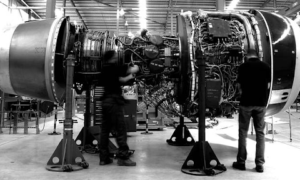From smartphones to industrial automation, camera modules have become an essential part of modern technology. What was once limited to photography is now shaping industries, improving security, and powering smart devices. Businesses are recognizing the value of high-performance imaging solutions, driving demand for better sensors, faster processing, and compact designs. Supertek Module Supplier, the leading camera module manufacturer, is at the forefront of these advancements, providing innovative solutions for various industries.
This shift isn’t just about better image quality—it’s about functionality. In retail, cameras assist with inventory tracking. In healthcare, they support diagnostics and minimally invasive procedures. In automotive, they enhance driver safety through advanced assistance systems. As industries evolve, companies investing in camera module innovation are positioning themselves for long-term success.
With rapid technological progress, businesses that integrate modern imaging solutions can improve efficiency, enhance customer experiences, and gain a competitive edge. The real question isn’t whether camera modules are important—it’s how companies can leverage them to stay ahead.
Why Investing in Camera Module Innovation Makes Sense
Businesses that prioritize camera module innovation are setting themselves up for long-term growth. As industries embrace automation, AI-driven analytics, and immersive digital experiences, advanced imaging technology is no longer optional—it’s a competitive necessity.
One key advantage is efficiency. In manufacturing, high-precision cameras improve quality control by detecting defects in real time. In security, improved imaging modules deliver sharper, more reliable footage, enhancing surveillance operations. Customer experience is another major factor. Retailers use smart cameras to personalize shopping, while automotive systems rely on them for safer driving.
Beyond immediate benefits, investing in better camera technology opens doors to new revenue streams. Companies investing in these advancements are opening doors to smarter devices, new service offerings, and expanding into high-growth markets like AR/VR and medical imaging. In short, those keeping pace with camera module advancements are gaining a stronger foothold in their industries.
Spotlight on Leading Innovators in Camera Module Technology
Advancements in camera module technology are being driven by companies specializing in high-performance imaging solutions. These innovators refine sensor capabilities, improve low-light performance, and integrate AI-powered image processing to meet the growing demand for smarter and more efficient visual systems.
In the consumer electronics sector, manufacturers focus on smaller, more powerful modules that enhance smartphone photography, video streaming, and augmented reality experiences. High-resolution sensors with advanced autofocus and noise reduction are now standard, delivering clearer images across devices.
For automotive applications, developments in camera modules are improving road safety by enhancing driver assistance systems, enabling automated parking, and supporting fully autonomous driving. These innovations make vehicles more aware of their surroundings, reducing risks and improving user experience.
Meanwhile, industries like healthcare, security, and manufacturing are leveraging high-precision imaging for diagnostics, surveillance, and quality control. Medical imaging solutions are now more compact and detailed. Security systems incorporate intelligent recognition, while factories automate defect detection and enhance production accuracy.
With ongoing advancements, businesses that adopt the latest camera module technologies will benefit from improved performance, efficiency, and adaptability in their respective markets. Supertek Module continues to develop advanced imaging solutions that help businesses optimize their operations and enhance product performance.
Real-World Applications: How Industries Are Benefiting
Camera modules are transforming industries by making products smarter, safer, and more efficient. In automotive, high-resolution cameras improve driver assistance, lane detection, and automated parking. These features not only add convenience but also play a critical role in reducing accidents and enhancing road safety. As vehicles become more autonomous, demand for high-precision imaging solutions continues to grow.
In healthcare, miniaturized camera modules enable more accurate diagnostics and minimally invasive procedures. From endoscopes that provide clearer internal imaging to AI-powered diagnostic tools that analyze medical scans, these technologies improve patient outcomes while giving medical professionals greater precision and control.
Consumer electronics is another sector where camera module innovation is making an impact. Smartphones, tablets, and wearable devices now feature advanced imaging systems with AI-enhanced capabilities, improving photography, video quality, and facial recognition. Meanwhile, AR and VR applications are becoming more immersive thanks to 3D sensing and depth-mapping technology.
Beyond these industries, camera modules are also driving progress in security, retail analytics, and industrial automation. Whether it’s tracking inventory, optimizing production lines, or enhancing surveillance systems, businesses that embrace these advancements are gaining a technological advantage in an increasingly competitive market.
Overcoming Challenges: Making Camera Module Integration Work
Adopting new camera technology comes with challenges, but businesses that address these hurdles effectively can unlock significant benefits. One common issue is hardware compatibility—integrating advanced camera modules into existing products or systems often requires adjustments in design, processing power, and connectivity. Companies can overcome this by collaborating with experienced module manufacturers who offer flexible solutions suited to different applications.
Data processing and storage is another challenge, especially for industries dealing with high-resolution imaging. Smart compression techniques and AI-driven image optimization can help manage large volumes of visual data without compromising quality or performance.
For industries like automotive and healthcare, reliability and durability are key concerns. Camera modules must perform consistently in various environments, from extreme temperatures to low-light conditions. Rigorous testing and selecting modules designed for specific industry needs can ensure long-term performance.
By addressing these challenges early in the development process, businesses can integrate camera modules more efficiently, improving product functionality and maintaining a competitive edge.
Looking Ahead: The Future of Camera Module Innovation
The future of camera modules is shaping up to be smarter, more efficient, and adaptable across industries. One major trend is the rise of AI-powered imaging, where built-in intelligence enhances real-time object detection, facial recognition, and low-light performance. This is particularly valuable in security, automotive, and consumer electronics, where precision and speed matter.
Another development is the miniaturization of high-performance modules. As devices become more compact, manufacturers are creating ultra-small cameras with powerful sensors that maintain image quality while fitting into slimmer designs. This is fueling advancements in wearable tech, medical imaging, and AR/VR applications.
3D sensing and depth-mapping technology are also gaining traction, improving applications such as facial recognition, autonomous navigation, and immersive virtual experiences.
In the coming years, advancements in multi-spectral imaging and computational photography are expected to push camera module capabilities even further, expanding their use in specialized fields like scientific imaging and industrial automation. Supertek Module remains committed to driving these innovations, helping businesses integrate the latest imaging technology into their products and systems.
Embracing Innovation for a Competitive Edge
Camera module technology is advancing rapidly, reshaping industries from automotive and healthcare to consumer electronics and security. Businesses that invest in these innovations benefit from improved efficiency, enhanced user experiences, and access to new market opportunities.
With AI-powered imaging, miniaturization, and 3D sensing leading the way, companies that prioritize high-performance camera modules will stay ahead of the competition. From improving safety systems to refining product performance and driving automation, advanced imaging is shaping the future of technology.
For tech-driven businesses, adopting the latest camera module solutions isn’t just an upgrade—it’s a smart investment in the future.



































